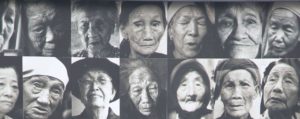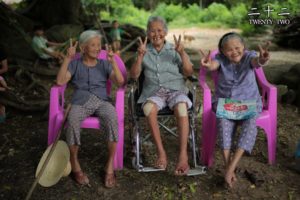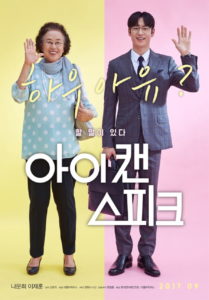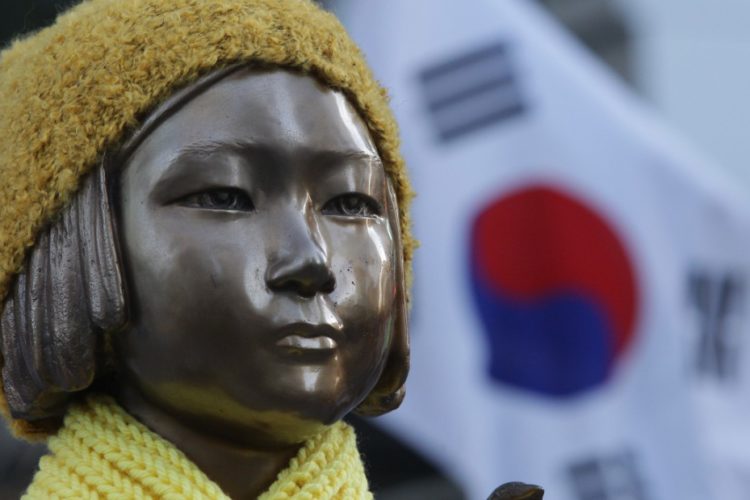During World War II and Japanese colonial period, thousands of women and young girls were forced into sexual slavery by the Japanese imperial army. Most of them were from South Korea, China, Taiwan and the Philippines. “Comfort women” is the euphemistic term for these women. Two recently released films on comfort women remind us that their pains remain even until today and that we need to remember the history.
Although two films share the same theme, the directors chose different formats to display messages. Making decisions on the genre of the film greatly depends on the ‘purpose’ of the films.


In 2015, there were approximately 22 living comfort women remaining out of more than 200,000 victims in China. Today, the number is down to less than 10.
A Chinese director Guo Ke attempted to preserve their faces and voices in a documentary film Twenty Two(二十二 èr shí èr).
The documentary film follows through the lives of the comfort women and depicts their personal perspectives on the world. In the documentary, the director doesn’t force anyone to speak about anything. Instead, he follows them and waits for them to say what they want to say. One of the comfort women in the film says,
If I get a quarter bowl I’ll eat a quarter bowl. If I get half a bowl I’ll eat half a bowl. I eat it quickly before thinking about how to get the next meal. I only lament that life is short, not about being poor. So long as one has a long life, forget poverty. The world really is great. I don’t want to die yet. The world is sparkling. Why would I want to die?
Overall, Guo Ke sheds light on how these comfort women are surviving everyday and creates a hopeful atmosphere to some extent. Throughout the film, the focus seems to be more on how they have moved on from their past and how they are trying their best at every moment. But there are moments where the women have to take pauses and reset to explain the past in details. These scenes are absolutely heartbreaking but powerful at the same time because they reveal how these women had to deal with traumatic memories for their entire lifetime.
Documentaries are great in terms of providing information and captivating an audience. Guo Ke doesn’t necessarily provide in-depth analysis on the history or comfort women. There are no external comments or narratives to analyze their lives. Instead, the documentary thoroughly presents glimpses of their lives in a very slow and careful manner. This is because Guo Ke wanted to present them in a hopeful and respectful tone but at the same time remind the audience. Hoping to alert people on the dwindling number of remaining “comfort women” in the country, Guo Ke decided to confront people with reality with a serious documentary.
“Comfort women” is a very sensitive issue to talk about in South Korea. Indeed, there had been rifts between the two countries for decades. Several films have already released based on comfort women and Japanese colonization in South Korea. So many Koreans have already been exposed to numerous documentaries and interviews on the subject and are award of this issue. With that, Hyun Suk Kim, the director of I Can Speak, chose a different format to appeal to the audience and deliver his message.

In the beginning, the movie tries not to give away hints that it is about comfort women or even anything related to history. Instead, it takes a form of a comedy, where the protagonist Ok Bun Nah, an old lady who files complaints with the local office every single day, insists a junior civil service officer named Min Jae teach her English. Without knowing the reason behind Ok Bun’s obsession with learning English, the audience can simply laugh at first.
The twist is that Ok Bun is in fact one of the survived comfort women and she wants to testify to pass House Resolution No 121, a resolution that Japan should formally accept and apologize for its coercion of young women into slavery during colonial times and World War II. This was actually based on a real event that happened back in 2007 where some of the surviving comfort women including Yong Su Lee and Gun Ja Kim testified before the court. The climax of the movie unfolds as Ok Bun boldly testifies and demands for an apology from Japan in the U.S. courtroom.
The combination of comedy and emotional weight of the serious message the director is trying to get across blends in effectively. The purpose of the movie is not to ‘inform’ people of the history. It’s more about telling the audience about what ‘should’ happen next and illustrating the courage of comfort women to raise their voices about this matter. In fact the title I Can Speak not only refers to speaking English but also indicates Ok Bun and other comfort women’s courage to stand up and speak about this issue. The director wanted to make a point that relationship between two countries regarding comfort women has still not been fully resolved. In one interview about the movie, the director actually stated that his hope is that through Ok Bun, those people that chose to stand by idly and ignore the issue will finally raise their voices.


One thought to “What Decides the Genre of a Film?”
Thank you for introducing the story of comfort women,
Japan left an indelible scar on innocent people.
I hope that Japan truly apologize to the comfort women.
The international community should be interested in this matter and the international community must help them.
Thank you for the good writing.
Comments are closed.